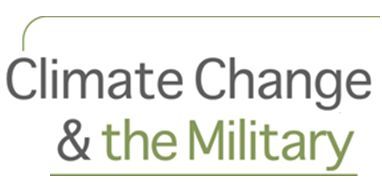CCTM - Climate Change and the Military

The CCTM Project was set up in 2009 with the aim to stimulate the debate on the relation between climate change and the role of the military. Central to this exercise was the MAC, 'Military Advisory Council', a group of serving and retired military officers calling for effective political actions to minimise the risks of climate change. By 2013 the MAC evolved into the current Global Military Advisory Council on Climate Change (GMACCC).
Rationale / Problem Analysis
The negative impacts of climate change are occurring much more rapidly than anticipated by the IPCC in 2007. This fact has been evidenced by the accelerated melting of the Arctic sea ice, the ice on Greenland and Antarctica, and the Himalayan and Andean glaciers. There is a growing awareness that climate change is not a 'linear' progression, but rather may manifest itself by abrupt and irreversible 'tipping points', such as the loss of glacial melt summer water in the great rivers of Asia. Furthermore, the military are increasingly aware that climate change could produce massive security challenges within their current planning time-scale.
The need for an international agreement based on a shared vision, shared goals, financial commitments and mechanisms to implement the necessary measures is greater than ever. The medium and long term costs of not taking adequate measures now outweighs the costs of these measures as illustrated in the Stern Report. Abrupt Climate Change, the financial crisis, the G20 reforms to global governance, coupled with the existing food and energy security crises, demand new ways of thinking from politicians and decision makers around the globe.
Military thinking can make a major contribution to these challenges. Including military and security perspectives in the calculation of the economic costs of addressing climate provides a further strong argument for taking immediate action. While the challenge of climate change is global, national security concerns and perspectives are 'local' and differ widely among nations.
With that in mind the CCTM project will be based on the latest scientific insights and long-standing military experience with, inter alia, international conflict prevention, peace missions and relief operations after natural disasters. More ambitiously, the explicit integration of foreign and security policy goals related to sustainable development, human rights and fragile states can make a valuable contribution to a united global response to climate change.
Expected Impacts
- Raise the issue of climate change and security higher on the agenda of international policy makers, environmental decision makers and military strategists world wide;
- Establish a continuing network of committed military officers (both retired and, when permitted, active duty) from around the world to promote an integrated approach to security and climate change;
- Highlight the potential geopolitical and military consequences of climate change and the costs of these consequences; and
- Foster increased interest in the role the military can play in humanity's effort to surmount abrupt climate change.
Featured Events
Environment, Development & Security: New Ideas, Fast Action - Brussels, 1 September 2010
Climate Change & Security After Copenhagen - Brussels, 17 February 2010
Delivering Climate Security: What the Security Community needs from a global climate regime - COP 15 Side Event, Copenhagen, 17 December 2009
Climate Change and International Security - Copenhagen, 15 December 2009
Climate Change & Security at Copenhagen - III: The Role of the Military - Washington, DC, 29 October 2009
Environment, Climate Change and Security - Facing the Challenges - Stockholm, 14-15 October 2009
MAC Members at UNFCCC Secretariat and United Nations University - Bonn, 12 October 2009
MAC Members at the Secretariat of the Council of the European Union - Brussels, 9 October 2009
Climate Change & Security at Copenhagen - II: The Contribution of the Global Security Community to Success - Brussels, 7-8 October 2009
Climate Change & Security at Copenhagen: New Thinking on the Atlantic Contribution to Success - Washington, DC, 17 Mar 2009
The Role of Military Organisations in Protecting the Climate - Paris, 3-5 Nov 2008
Roundtable Workshop Environment & Security: Challenges for Change - Barcelona, 6 Oct 2008
For more related IES events see the programme on Climate Change and International Security
CCTM Resources
Climate Change & the Military: The State of the Debate (pdf)
First Statement of the Military Advisory Council (pdf)
MAC members talk about environmental security and the role of the Military (video) X
Copenhagen - 17 December : Climate Change & the Military: Actions Beyond Copenhagen - Tom Spencer (ppt)
MAC member Rear Admiral Neil Morisetti interviewed by NBC on climate change and armed conflicts. Watch the video on NBC website. X
Project Organisation
Military Advisory Council (MAC)
Project Advisory Group (PAG)
Governmental and Parliamentary Contact Group (GPCG)